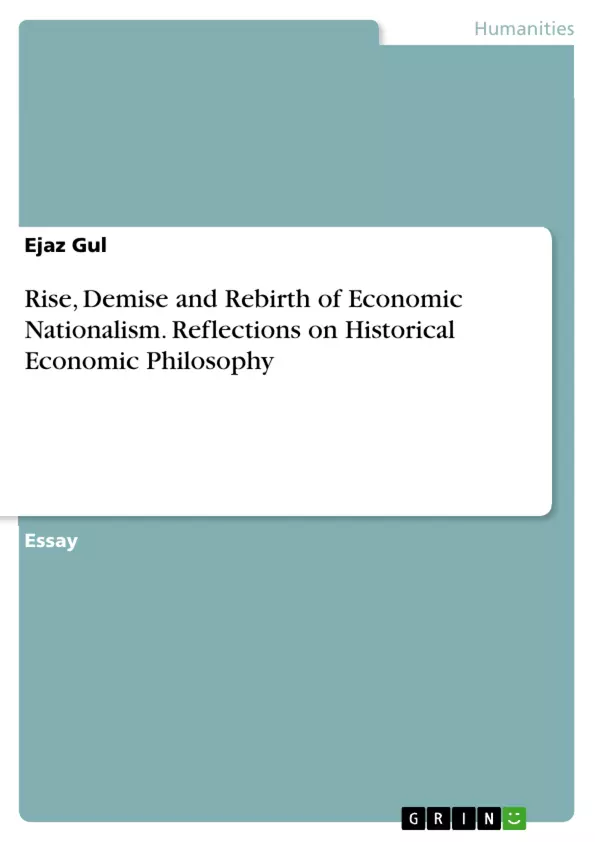This paper presents a valuable and interesting study on economic philosophy of economic nationalism. Economic Nationalism (formally known as Mercantilism) was the dominant school of thought in Europe from the 16th to 18th Century. Here it is assumed that wealth and monetary assets are identical. Mercantilism suggests that the ruling government should advance economic goals by playing a role in the economy mainly by encouraging exports and discouraging imports. The theory dominated economic policies of Europe and is believed to have encouraged the many intra-European wars of the period and played a role in expansion of European Imperialism both in Europe and throughout the rest of the world.
Many economists around the globe have written about the economic philosophy of Mercantilism, however, there is need to understand the true context of philosophy based on socio-economic environment which was prevailing at that time. This research paper is about the rise and fall of economic nationalism as a philosophy bringing out facts about roots of philosophy, the role it played in the economics of 18th Century and the causes of its demise. The paper also describes the relevance of economic nationalism in the 21st century. It concludes that the philosophy of economic nationalism is still being partially practiced in the 21st century, in one form or the other, under the carpet of economic liberalism. Strangely, many of our fiscal, monetary and general economic reforms in 21st century are in line with the philosophy of economic nationalism.
Inhaltsverzeichnis (Table of Contents)
- Introduction
- Conceptual Contours of Philosophy of Economic Nationalism
- The Rise of Philosophy
- Role of Economic Nationalism in Inter State Economic Relations of 18th Century
- The Demise of Economic Nationalism
Zielsetzung und Themenschwerpunkte (Objectives and Key Themes)
This research paper examines the rise, fall, and resurgence of economic nationalism, also known as Mercantilism, as a dominant economic philosophy from the 16th to the 18th centuries. The paper aims to analyze the origins, key principles, and impact of this doctrine on international economic relations during its heyday and explore its relevance in the 21st century.
- The evolution and conceptual foundations of Mercantilism.
- The role of Mercantilism in shaping interstate economic relations during the 18th century.
- The factors contributing to the decline of Mercantilism as a dominant economic philosophy.
- The re-emergence of economic nationalist ideas in the 21st century.
- The relevance of Mercantilist principles in modern economic policy.
Zusammenfassung der Kapitel (Chapter Summaries)
- Introduction: This chapter provides an overview of economic nationalism, defining its key principles and outlining the paper's objectives. It highlights the historical context of Mercantilism as a dominant economic theory during the 16th to 18th centuries and foreshadows its relevance in the 21st century.
- Conceptual Contours of Philosophy of Economic Nationalism: This chapter delves into the central tenets of Mercantilism, highlighting its emphasis on national wealth accumulation through a positive balance of trade, governmental intervention in economic affairs, and the link between economic and political power.
- The Rise of Philosophy: This chapter explores the historical context that gave rise to Mercantilism, highlighting the influence of the Age of Exploration and the desire for state power among newly emerging monarchies. It examines the role of figures like Thomas Mun and their contributions to the development of Mercantilist ideas.
- Role of Economic Nationalism in Inter State Economic Relations of 18th Century: This chapter analyzes the impact of Mercantilism on international economic relations during the 18th century, focusing on the emphasis on national wealth accumulation, trade regulation, and the pursuit of power through economic means.
- The Demise of Economic Nationalism: This chapter discusses the criticisms and factors that led to the decline of Mercantilism, including the rise of alternative economic philosophies, the critique of excessive state intervention, and the shift towards free trade ideas.
Schlüsselwörter (Keywords)
The central themes and concepts explored in this research paper include economic nationalism, Mercantilism, philosophy of economics, international economic relations, 18th century, 21st century, liberalism, trade, wealth, state intervention, power, and free trade.
Frequently Asked Questions
What is Economic Nationalism or Mercantilism?
Mercantilism is an economic philosophy suggesting that a government should advance national wealth by encouraging exports and discouraging imports, often linking economic power to political strength.
Why did Mercantilism decline in the 18th century?
The decline was caused by the rise of alternative philosophies like economic liberalism, which critiqued excessive state intervention and favored free trade ideas.
How is Economic Nationalism relevant in the 21st century?
The paper concludes that economic nationalism is still practiced today, often "under the carpet" of economic liberalism, influencing modern fiscal and monetary reforms.
What was the role of the state in Mercantilist theory?
The ruling government played a central role by regulating trade and intervening in the economy to ensure a positive balance of payments and national security.
How did Mercantilism affect international relations?
It is believed to have encouraged many intra-European wars and played a significant role in the expansion of European Imperialism throughout the world.
- Quote paper
- Ejaz Gul (Author), 2005, Rise, Demise and Rebirth of Economic Nationalism. Reflections on Historical Economic Philosophy, Munich, GRIN Verlag, https://www.grin.com/document/376080



